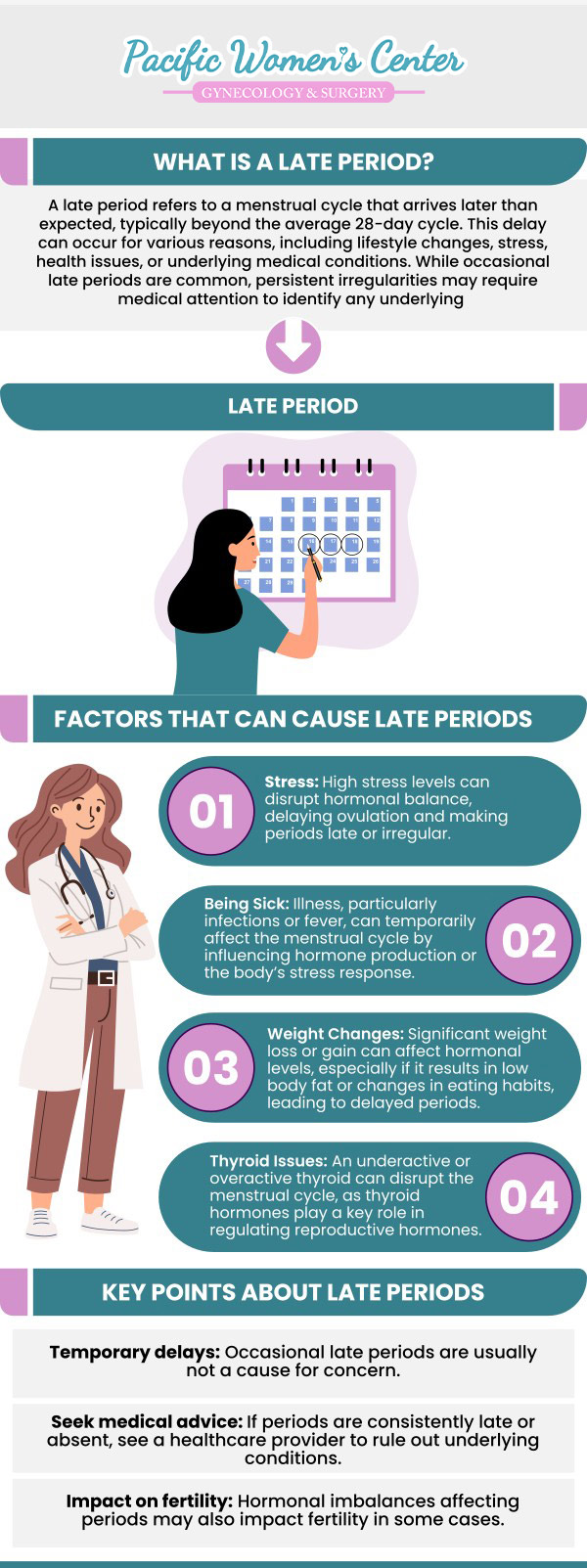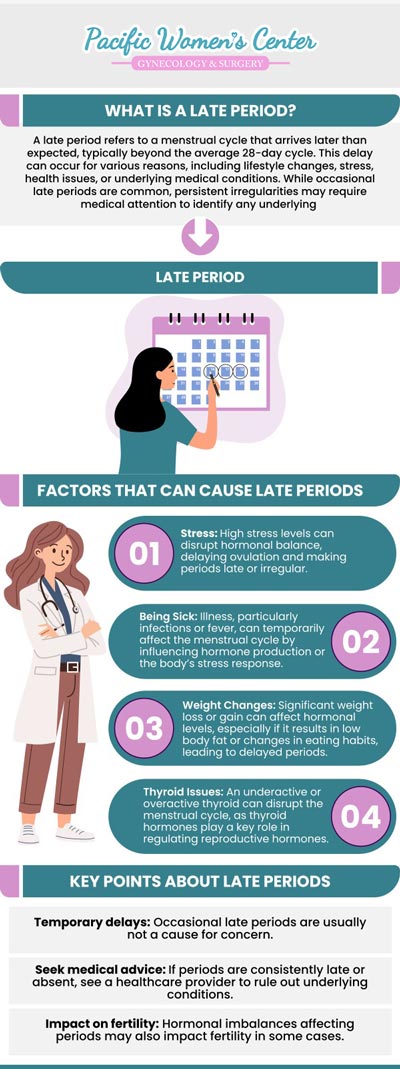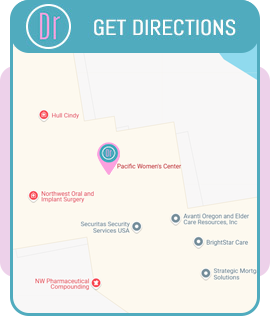Is It Normal to Have a Late Period Every Once in a While?
Occasional late periods can be normal, but if you’re concerned, it’s important to understand the underlying causes. Factors such as stress, diet, or hormonal changes can contribute to a delayed period. Dr. Richard Beyerlein MD, CPI, FACOG, and Tamara A. Stenshoel, MD, FACOG, offer comprehensive care and guidance for menstrual irregularities. For more information or to schedule an appointment, contact us today. We are conveniently located at 911 Country Club Rd. Suite 222, Eugene, OR 97401.


Table of Contents:
How can stress affect your menstrual cycle and cause a late period?
What are the common reasons for a late period?
Can a late period indicate a health issue?
How can lifestyle changes impact the timing of your period?
At Pacific Women’s Center, we understand that stress is a common issue that can significantly impact women’s health, particularly the menstrual cycle. Our dedicated team of healthcare professionals is here to support you in navigating these challenges and maintaining your overall well-being.
Stress can affect the hypothalamus, a critical part of your brain responsible for regulating the menstrual cycle. When stress levels rise, the release of stress hormones like cortisol and adrenaline can disrupt the hypothalamus’s function, potentially leading to delayed or missed periods. This interference can cause delayed ovulation or even an anovulatory cycle, where ovulation does not occur, further contributing to menstrual irregularities.
At Pacific Women’s Center, we know that stress can also affect the balance of other essential hormones, such as estrogen and progesterone, which play a vital role in maintaining a regular menstrual cycle. Additionally, stress can lead to lifestyle changes, including alterations in diet, sleep, and exercise routines, all of which can indirectly impact menstrual health.
We offer comprehensive care and personalized strategies to help manage stress and its effects on your menstrual cycle. Our team can guide you in adopting stress-reduction techniques, such as mindfulness, regular physical activity, and relaxation exercises, to help maintain hormonal balance and improve menstrual regularity.
If stress is causing significant disruptions in your menstrual cycle, we encourage you to schedule a consultation with us at Pacific Women’s Center. Our experienced healthcare providers will work with you to evaluate your symptoms, identify underlying causes, and develop a tailored plan to restore your menstrual health and overall well-being.
Pacific Women’s Center is dedicated to providing comprehensive care and support for women’s health concerns, including menstrual irregularities such as late periods. Our team of experienced healthcare providers understands that a late period can be a source of anxiety and confusion, but we emphasize that there are several common reasons for this occurrence, many of which are not serious.
A late period can be caused by several factors, and while it can sometimes be normal, it’s important to understand the underlying reasons. Common causes include:
1. Stress: High levels of physical or emotional stress can disrupt hormonal balance, delaying ovulation and causing a late period. Stress affects the hypothalamus, the part of the brain that controls the menstrual cycle.
2. Changes in Weight: Significant weight gain or loss, or eating disorders like anorexia or bulimia, can affect the hormonal regulation of menstruation. Body fat plays a role in producing estrogen, and imbalances can lead to irregular periods.
3. Polycystic Ovary Syndrome (PCOS): PCOS is a common condition that affects ovulation and hormone levels, often leading to irregular or missed periods. It’s associated with an imbalance of reproductive hormones.
4. Pregnancy: A missed or late period is often the first sign of pregnancy. If you’ve had unprotected sex, it’s important to take a pregnancy test if your period is late.
5. Birth Control: Starting or stopping hormonal birth control can cause temporary disruptions in your menstrual cycle. Some birth control methods, such as the pill, IUD, or injection, can make periods lighter or stop them altogether.
6. Thyroid Issues: Both hypothyroidism (low thyroid function) and hyperthyroidism (high thyroid function) can impact menstrual regularity. Thyroid hormones play a role in regulating the menstrual cycle.
7. Perimenopause: As women approach menopause, typically in their late 40s or early 50s, they may experience irregular periods as their hormone levels fluctuate.
If your period is consistently late or accompanied by other unusual symptoms, it’s important to consult with a healthcare provider for further evaluation.
At Pacific Women’s Center, we understand the nuances and complexities of women’s health, particularly when it comes to menstrual irregularities. A late period can be a common concern among our patients, and while it is not always a cause for alarm, it can indicate various health issues that deserve attention. Our team is dedicated to providing comprehensive care and support for women experiencing changes in their menstrual cycle.
One of the primary reasons for a late period is pregnancy, especially for those who are sexually active. However, other factors such as stress, significant weight changes, or conditions like polycystic ovary syndrome (PCOS) can also contribute to delays. At Pacific Women’s Center, we offer personalized consultations to help identify these underlying causes, utilizing state-of-the-art diagnostic tools to assess hormonal imbalances and other potential issues.
We recognize that lifestyle factors, including high-intensity exercise and eating disorders, can impact menstrual regularity. Our holistic approach to healthcare ensures that we consider all aspects of your lifestyle when evaluating menstrual changes. Additionally, conditions such as thyroid disorders and the side effects of certain medications, including birth control, are thoroughly assessed by our experienced team.
As women approach menopause, understanding the transition and its impact on menstrual cycles is crucial. We provide expert guidance for those in their late 40s or early 50s, as well as those experiencing premature menopause, to navigate these changes with confidence.
Lifestyle changes can significantly impact the timing of your period, as they influence the hormonal balance that regulates your menstrual cycle. Some key lifestyle factors that can affect your period include:
1. Diet and Nutrition: A drastic change in diet, whether through weight loss or gain, can disrupt the menstrual cycle. Low body fat, often due to restrictive diets, can lead to irregular or missed periods. Conversely, weight gain, especially abdominal fat, can cause hormonal imbalances that affect the timing of your period. Eating a balanced diet with adequate nutrients, such as iron, calcium, and healthy fats, supports hormone production and menstrual regularity.
2. Exercise and Physical Activity: Intense exercise, particularly in athletes or individuals who engage in vigorous training, can lead to irregular periods or even a complete cessation of menstruation. This is often due to a low body fat percentage or excessive physical stress. On the other hand, regular moderate exercise can help maintain a healthy weight and reduce stress, which can contribute to more consistent cycles.
3. Stress: Chronic stress can have a profound impact on the menstrual cycle. Stress activates the body’s fight-or-flight response, which affects the hypothalamus, the area of the brain responsible for regulating hormones that control menstruation. High levels of stress can delay ovulation and cause late or missed periods. Managing stress through relaxation techniques like meditation, deep breathing, or yoga can help restore cycle regularity.
4. Sleep Patterns: Poor sleep or inconsistent sleep schedules can disrupt the body’s natural circadian rhythms, which in turn can affect hormone levels involved in the menstrual cycle. Getting sufficient rest and maintaining a regular sleep schedule can support hormonal balance and help keep your period on track.
By adopting healthy lifestyle habits, such as maintaining a balanced diet, managing stress, getting enough sleep, and exercising regularly, you can help regulate your menstrual cycle and potentially reduce the likelihood of late or missed periods. However, significant or ongoing changes in your cycle should be discussed with a healthcare provider to rule out underlying health issues.
At Pacific Women’s Center, we’re dedicated to empowering you with the knowledge and resources needed to make positive lifestyle changes that support your menstrual health. For more information, contact us or schedule an appointment online. We are conveniently located at 911 Country Club Rd. Suite 222, Eugene, OR 97401. We serve patients from Eugene OR, Springfield OR, Coburg OR, Creswell OR, Cottage Grove OR, Lowell OR, Junction City OR, and surrounding areas.

ADDITIONAL SERVICES YOU MAY NEED
❱ Abdominal Hysterectomy
❱ Bladder Lift Surgeon Q&A
❱ Cervical Cone Biopsy
❱ Colposcopy
❱ Endometrial Ablation
❱ Endometrial Biopsy
❱ Female Sexual Dysfunction
❱ Gynecological Surgery
❱ Gynecology
❱ Hormone Therapy
❱ Vaginal Hysterectomy
❱ Endometriosis Diagnosis & Care



